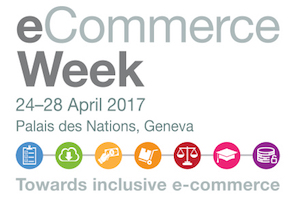G20 digital economy: Shaping digitalization for an interconnected world and G20 priorities on digital trade
26 Apr 2017 02:00h
Event report
Dr Stormy-Annika Mildner, B20 Sherpa, Head of the Department of External Economic Policy, Bundesverband der Deutschen Industrie (BDI), Federation of German Industries, made an overview of the B20’s activities. The B20 represents the G20 business community, and currently has more than 700 members. The work of the B20 takes place in three thematic groups: a) trade and finance; b) digitalisation; c) SMEs. The B20 made some key recommendations:
- Accelerate capacity building in the field of e-commerce
- Develop sound and harmonised e-commerce related policies
- Adapt trade rules to the digital age
- The WTO should have a mandate to negotiate digital trade
- Enable cross-border data flows.
Dr Gunther Grathwohl, Counsellor at the Federal Ministry for Economic Affairs and Energy, started by making an overview of how digital economy has been addressed by the G20. The G20 Antalya Summit was the first time the topic was discussed. During the G20 Hangzhou Summit, a task Force was proposed, and thus the G20 Digital Economy Task Force (DETF) was launched at the Düsseldorf Summit. The DETF deals with the following themes:
- Digitalisation, growth and employment, which encompasses several pillars, such as: improving infrastructure, analysing the role of digital platforms (including their impact on competition) and developing digital skills in education.
- Digitalisation of production for the future, which includes, for example, connecting machines across enterprises, harmonising industry standards in areas such as the Internet of Things (IoT).
- Creating trust, confidence and transparency, which includes principles such as free flow of data, privacy, and security.
Grathwohl highlighted some of the results of the process so far: the approval of a ministerial declaration; a roadmap; and a plan of action for the coming years; as well as annexes dealing with digital skills and digital trade. The G20 also committed to other goals, such as promoting digital inclusion, fostering competition, use of digitalisation as a way to achieve the SDGs, and enhancing consumer protection and digital literacy skills.
Dr Walter Werner, Ambassador of Germany to the WTO, focused on the e-commerce-related discussions at the G20. He commented on the discussions of the G20 Digital Ministries Conference and the results of the work of the Trade and Investment Working Group. The following topics are being discussed at the working group:
- Measuring digital trade. The OECD has provided input to these discussions and provided statistics. Services, for example, are not well captured in statistics.
- International Frameworks for digital trade. This discussion was informed by a WTO presentation.
- The development dimension of digital trade, informed by UNCTAD.
The declaration that was produced touches upon points, such as:
- Promotion of growth and jobs.
- Commitment to improve measurement and statistics. This topic will be very prominent in MC11 in Argentina.
- Commitment to engage in discussions at the WTO, without consensus about opening negotiations.
- Implementation of the Trade Facilitation Agreement and including digital trade aspects in Trade Policy Reviews.
- Commitment to help developing countries overcome the barriers to digital trade. The theme should be further discussed at the working group and international organisations should be invited to assist.
During the questions and answers segment, a TWN representative asked how the G20 proposals relate to points raised by the EU at the WTO, which ne considered not be beneficial to developing countries. Werner replied that the EU has hold only of information exchanged among member countries, tacking stock of current status and options ahead. Another participant asked if there are multilateral discussions to develop a framework for a harmonised recognition of digital signatures. Currently they are recognised on a national basis and not cross-border. Werner replied that there is no common standard and the position for the time being is that every country should recognise digital signatures as valid, but discussions are not mature enough to agree on specific standards. Perhaps the issue should not be tackled by the WTO, but rather by other international organisations, such as for example the ITU.
Related topics
Related event

